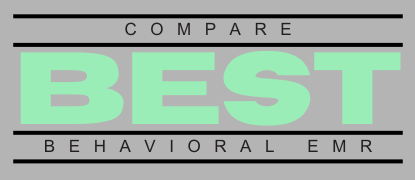As a behavioral health practitioner, selecting the right Behavioral Health EMR (Electronic Medical Record) system is critical for your practice’s ongoing success and efficiency. The right EMR can streamline your clinical workflows, enhance documentation accuracy, and support your practice’s growth. But with so many EMR systems available, how do you know which one is the best fit for your practice? In this guide, we’ll walk through essential considerations to help you confidently choose a Behavioral Health EMR that grows with your practice.
Why the Right Behavioral Health EMR Matters
As your practice scales, your needs evolve. An EMR system that works well for a small practice may not handle the increased complexities of a larger clinical team or expanded patient base. Choosing a Behavioral Health EMR designed specifically for scalability, smooth clinical workflows, and ease-of-use can significantly impact your practice’s long-term success.
According to the National Institutes of Health (NIH), implementing the right EMR can improve patient outcomes, reduce clinician burnout, and enhance administrative efficiency. Conversely, selecting the wrong system can lead to frustration, lost productivity, and costly disruptions.
Key Considerations When Evaluating EMR Systems
To ensure you’re selecting an EMR that aligns with your practice goals, consider the following factors.
1. Scalability and Growth Potential
Choosing an EMR that accommodates growth is essential. Ask yourself:
- Will this EMR comfortably support an increased number of clinicians and patients over the next 3-5 years?
- Does the EMR vendor offer flexible plans or upgrades as your practice expands?
- Is the platform capable of integrating new features, such as telehealth, billing, or CRM modules, as you need them?
Selecting a scalable Behavioral Health EMR from the start can save you from the hassle and cost of switching systems later.
2. User-Friendly Interface and Ease-of-Use
Your clinicians’ primary focus should be patient care—not navigating complicated EMR interfaces. Look for EMR systems with intuitive designs that require minimal training. Consider these points:
- Can clinicians document patient encounters easily and efficiently?
- Is the EMR accessible from multiple devices (laptops, tablets, smartphones)?
- Does the EMR provider offer user training and responsive customer support?
An easy-to-use Behavioral Health EMR promotes better user adoption, improving overall productivity and reducing clinician burnout.
3. Behavioral Health-Specific Clinical Workflows
Behavioral health practices have unique documentation and compliance requirements. Ensure your EMR platform is specifically designed for behavioral health rather than a generalized medical solution. Behavioral health EMRs typically offer specialized features including:
- Customizable therapy notes and treatment plan templates
- Mental health assessment tools and outcome measures
- Compliance reminders for regulatory requirements and audits
Choosing a specialized Behavioral Health EMR ensures your practice operates smoothly, maintaining compliance and improving patient care quality.
4. Integration Capabilities and Interoperability
A strong EMR should seamlessly integrate with other software you use, such as revenue cycle management (RCM) systems, scheduling platforms, teletherapy solutions, and customer relationship management (CRM) tools. Consider these questions:
- Does the EMR easily integrate with your existing billing and scheduling systems?
- Can you share information securely and efficiently with outside providers or other healthcare facilities?
- Does the vendor support standard interoperability protocols?
Integrated EMR systems streamline your practice management, reduce administrative burden, and enhance the patient experience.
5. Data Security and Compliance
Patient confidentiality and data security are critical in behavioral health. Your EMR must meet rigorous security standards such as HIPAA compliance, data encryption, and secure electronic data storage. Be sure to verify:
- Vendor reputation regarding privacy and security practices
- The EMR’s compliance certifications and audit history
- Protocols for data backup, disaster recovery, and breach notifications
Tips for Successfully Choosing Your Behavioral Health EMR
Involve Key Stakeholders Early
Include clinicians, administrative staff, and IT personnel in your EMR selection process. Their firsthand insights can ensure the chosen EMR meets everyone’s needs.
Request Demonstrations and Trials
Always request live demonstrations or free trials. Hands-on experience provides clarity about how user-friendly and efficient the platform really is.
Check Client References and Reviews
Reach out to current users of the EMR systems you’re considering. Hearing directly from other behavioral health practice owners can provide valuable, unbiased feedback.
Evaluate Long-Term Costs and ROI
Consider both the upfront and ongoing costs associated with each EMR. While cost is important, the cheapest option isn’t always the most cost-effective long-term solution. Evaluate potential returns on investment through efficiency gains, improved documentation accuracy, and enhanced patient care.
Conclusion: Making the Right Choice for Your Practice
Selecting the right Behavioral Health EMR is a critical decision that significantly impacts your practice’s efficiency, compliance, and overall success. By carefully considering scalability, ease-of-use, specialized workflows, integration capabilities, and security, you’ll be well-equipped to choose an EMR that supports your practice’s growth and long-term success.
If you’re still unsure about which EMR solution is right for you, consider using our free practice analysis. Our experts will review your practice’s unique needs and provide personalized EMR recommendations tailored specifically for your growing behavioral health practice.
Meta Description: Discover essential tips for choosing a scalable, user-friendly Behavioral Health EMR to streamline workflows and support your growing practice.
